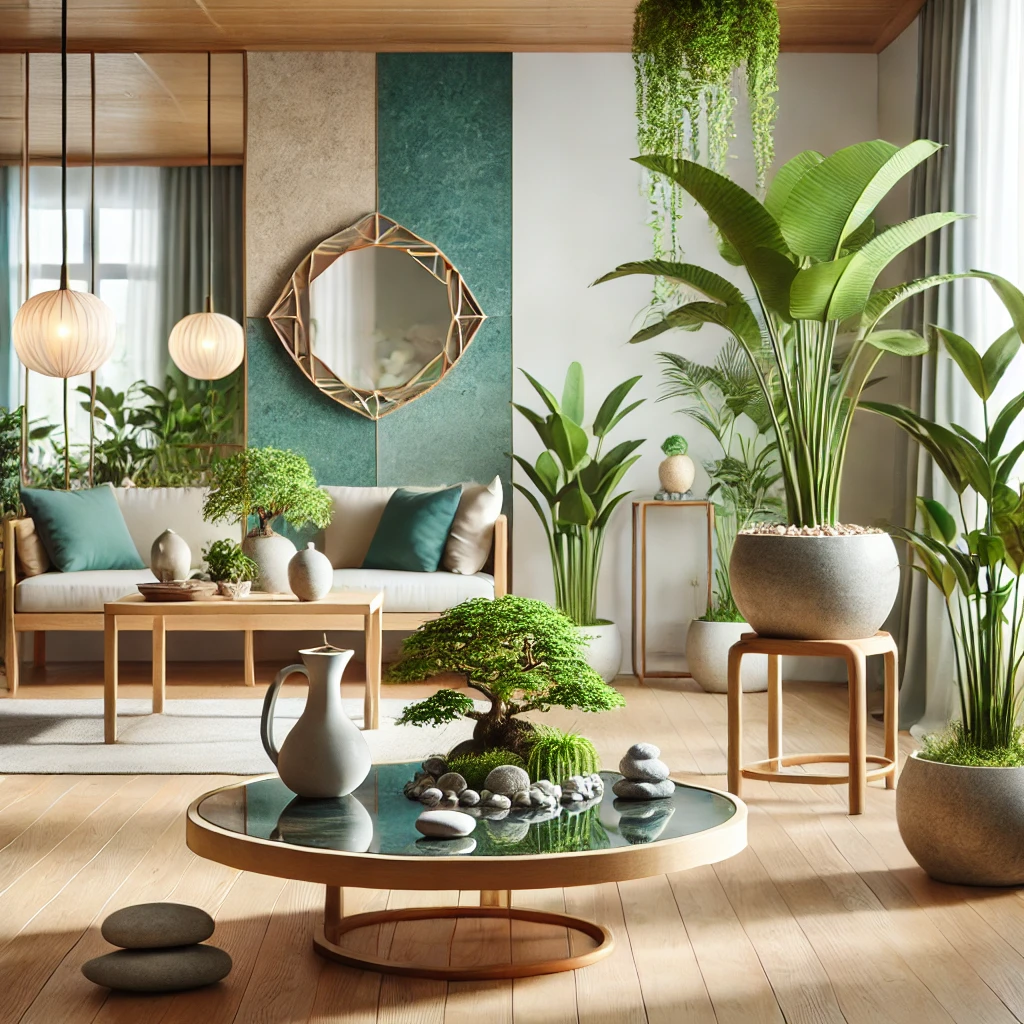Feng Shui is the ancient Chinese practice that harmonizes energies in a space for balance, serenity, and prosperity. From the Chinese words “wind” and “water,” Feng Shui believes that everything has energy, including space and objects. The 5,000-year-old practice is extremely popular around the world for homes that can enhance well-being, success, and peace. With Feng Shui knowledge and practice, every human being can transform any home into a positive inspirational habitat.
What is Feng Shui?
Feng Shui is a philosophical approach to spatial arrangements and focuses on flowing chi. Organizing spaces according to natural energy forces helps create harmonious, inviting environments. Every space, whether a bedroom, office, or living room, has unique energy that can be utilized positively with the help of Feng Shui techniques.
Core Elements of Feng Shui
Five elements are fundamental to Feng Shui, namely wood, fire, earth, metal, and water. Each of these has some qualities and energies behind it. For balance to be achieved, each one of these must be used in the correct proportions as follows:
Wood: The element of growth, creativity, and strength. Wood element can be brought into life by plants or wooden furniture to inspire personal growth and innovation.
Fire: Adds passion, energy, and motivates, energizing your space to increase productivity because of elements like candles, lights, or shades of red.
Earth: Introduces stability and grounds energy with stones, clay, or brown tones through elements that bring calm and patience.
Metal: All about clarity, precision, and strength, this will keep things in order and is efficient with metal decor frames or metallic colors.
Water: Fluidity and emotions are balanced through adaptable fluid elements such as water, blue hues, or reflections in mirrors.
Harmonious living space: All the five elements are encompassed within the room, which supports a space that is both productive and relaxing.
Feng Shui Basics for Various Rooms
Every room is different because it has a different purpose, and Feng Shui principles are made different according to the needs of that particular space.
1. The Living Room
The living room is broadly regarded as the social central point in homes. Siting seats in this room aims to encourage people to interact and walk around, circulating. Use mirrors to an extent of enlarging the space and letting natural lights penetrate. Plant life is also valued, especially with the inclusion of wood element: it tends to encourage growth and connecting.
2. Bedroom
A bedroom is a sanctuary of rest and intimacy. The placement of the bed can maximize relaxation. Place it in such a way that the door is not directly facing the bed, but can be seen from the command position, so you have the door in your line of vision without being in the line of the door. That is secure. Soft and soothing colors like blues and earth tones are good at facilitating sleep. Electronic appliances must be kept to the barest minimum as they will disturb the peaceful vibes for sleep.
3. The Kitchen
The Kitchen should be kept clean and free from clutter, with an emphasis on hygiene and organization. Natural colors such as green or yellow are added, which symbolize nourishment and health. The stove should be placed in a position where the cook can see the door while preparing meals. If that is not possible, a mirror placed near the stove will serve the same purpose.
Feng Shui Tips on Harmonizing Your Living Space
Clear Clutter
A disorganized space can trap stale chi. The effort of arranging and removing excess allows free movement of energy in the home. Areas that have been decluttered increase mental clarity as well as emotional stability.
Balance Colours
For Feng Shui, every color represents an element. One element contains certain energies: here’s a color key and the effect on someone’s life:-
Red: it energizes, activates, it is used in very minimal amounts.
Yellow: creates happiness and positive
Green: promotes growth freshness, rejuvenation
Blue: calms, cool
White: purity, transparency.
Use colors based on purpose of the room you use it in and also by your personal preference to create invited energy.
Light coming from the natural window
Natural light can be a significant source of positive energy. It will brighten a space, increase productivity, and uplift mood. You can utilize mirrors to reflect natural light into dark spaces. Make sure to light curtains or open blinds for the utmost flow of sunlight within your home.
Use Indoor Plants
Plants freshen the air inside and bring in the wood element to a room, which symbolizes growth and prosperity. Some of the most common Feng Shui plants are bamboo, jade plants, and money trees. If you want to create a space that brings in relaxation and peace, you should avoid having thorny plants like cacti.
Be Mindful of Entrance End
The entry area is that part of the house where a guest would first look and energy flows into the house. Make sure to keep this place clean and welcoming, so positive energy can flow into the place. Include a small table with fresh flowers or even a mirror, but do not litter it when placing things by the door. Make sure that the front door is robust and in good condition.
Feng Shui and the Bagua Map
The Bagua map has the application in Feng Shui to recognize how every place in a space fits various elements of life into categories such as wealth, health, relationships, or career. Each element carries its color. Balancing a room or objects along that map helps direct the energy towards specific life goals.
Advantages of Practising Feng Shui
By applying Feng Shui, people often experience the following:
Improved Energy Flow: A balanced space reduces stress, enhances productivity, and promotes creativity.
Better Relationships: Harmonized spaces improve communication and social dynamics, creating a more welcoming atmosphere.
Increased Prosperity: Feng Shui can attract wealth, career success, and opportunities.
Enhanced Well-being: A space designed with Feng Shui principles supports mental and emotional health, leading to overall happiness and fulfillment.
Conclusion
Feng Shui is basically about designing spaces to harmonize with natural energy forces in order to bring about higher quality of life. Whether through color, furniture placement, or decorations, Feng Shui transforms any given home into a haven that exudes serenity and positivity. Anyone can produce an environment that not only looks beautiful but also nurtures the mind, body, and spirit with just a bit of effort and attention to detail.













Přijetí hypoteční platby může být obtížné pokud nemáte rádi čekání v dlouhých řadách ,
vyplnění intenzivní formuláře , a odmítnutí úvěru na
základě vašeho úvěrového skóre . Přijímání hypoteční platby může být problematické, pokud nemáte rádi čekání v dlouhých řadách ,
podávání extrémních formulářů , a odmítnutí úvěru na základě vašeho úvěrového skóre .
Přijímání hypoteční platby může být problematické , pokud nemáte rádi čekání v dlouhých řadách , vyplnění extrémních formulářů a odmítnutí
úvěrových rozhodnutí založených na úvěrových skóre .
Nyní můžete svou hypotéku zaplatit rychle a efektivně v České republice. https://groups.google.com/g/sheasjkdcdjksaksda/c/tndv7pDkow0
Přijetí hypoteční platby může být obtížné pokud nemáte
rádi čekání v dlouhých řadách , vyplnění intenzivní formuláře , a odmítnutí úvěru na
základě vašeho úvěrového skóre . Přijímání hypoteční platby může být problematické,
pokud nemáte rádi čekání v dlouhých řadách
, podávání extrémních formulářů , a odmítnutí
úvěru na základě vašeho úvěrového skóre .
Přijímání hypoteční platby může být problematické ,
pokud nemáte rádi čekání v dlouhých řadách , vyplnění extrémních formulářů
a odmítnutí úvěrových rozhodnutí založených
na úvěrových skóre . Nyní můžete svou hypotéku zaplatit rychle a efektivně v České republice. https://groups.google.com/g/sheasjkdcdjksaksda/c/tndv7pDkow0